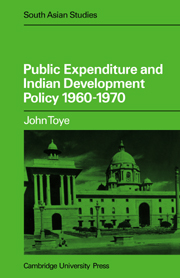9 - The Indian state accumulation policy in retrospect
from PART THREE - CONCLUSIONS
Published online by Cambridge University Press: 09 January 2010
Summary
The empirical core of this work has been a detailed examination of the development of public spending at the all-India and at the state level. What remains to be done is to connect some of the empirical findings with the broader themes of mimetic nationalism and state accumulation which were explored in the two opening chapters.
It is proposed to examine the connections in three stages of argument. The first considers the constraints which mimetic nationalism imposed on the process of state accumulation, and suggests what additional conditions would have to be satisfied before a state accumulation policy could operate successfully within those constraints. The second considers the desiderata, purely within the sphere of the public finances, of a successful state accumulation policy against the background of the actual state of the Indian public finances. The third examines briefly the prospects for improved control over public expenditure in the present state of Indian federalism.
MIMETIC NATIONALISM AND STATE ACCUMULATION
There is no necessary connection between mimetic nationalism and state accumulation. The former is quite compatible with private accumulation, and the latter policy could be operated in advanced capitalist nations on whom the pressures that produce mimetic nationalism do not bear. Thus the only link between mimetic nationalism and state accumulation is one of historical contingency.
The state accumulation policy was discussed in Chapter 1 in the abstract.
- Type
- Chapter
- Information
- Public Expenditure and Indian Development Policy 1960–70 , pp. 215 - 233Publisher: Cambridge University PressPrint publication year: 1981



